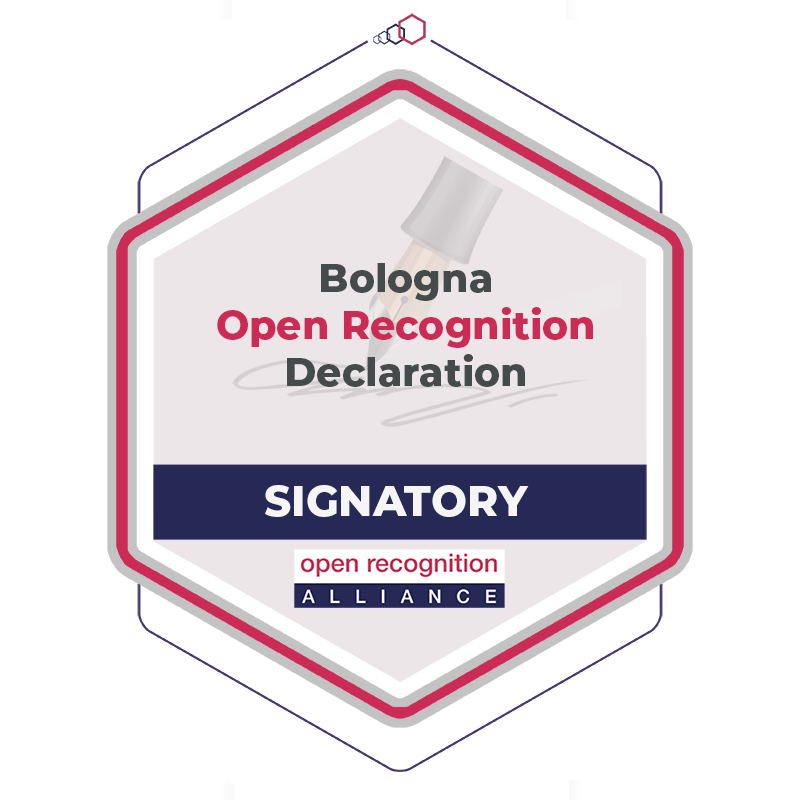Badges and Microcredentials
Delivered in Canada by Canadians
Learning Agents is the host of CanCred.ca. We’re a leading Canadian solution for digital credentials, delivering two matching services:
- CanCred Factory (this platform), for subscribing organizations to create and issue micro-credentials and other digital badges that follow the Open Badges technology standard for digital credentials
- CanCred Passport, our companion platform for badge recipients to store and share the badges they receive. This service is provided free of charge, with no obligation or advertising, and is fully compliant with Canada’s privacy laws.
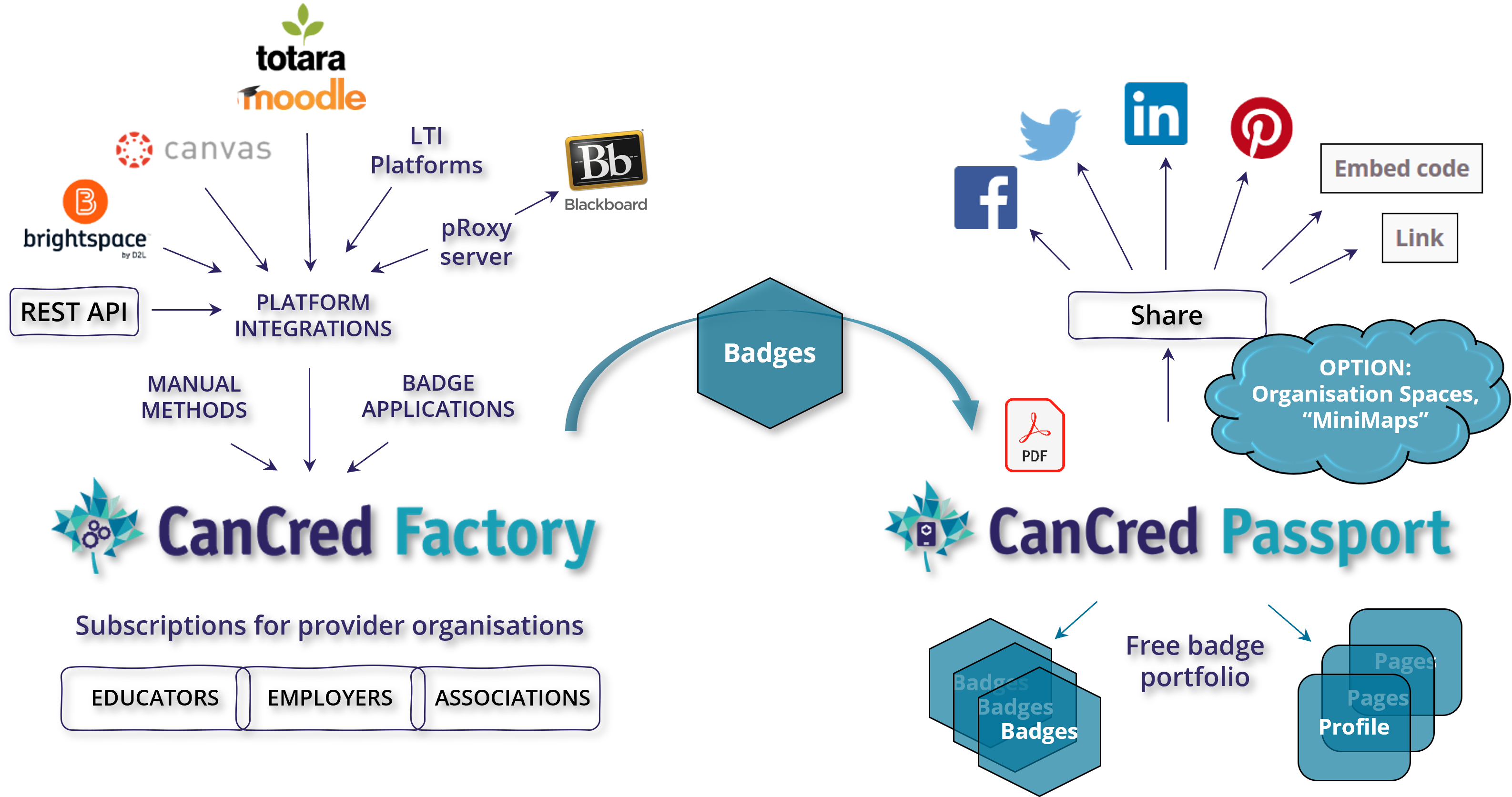
Learning Agents is the sole partner in Canada of Open Badge Factory (OBF) Solutions, creators of Open Badge Factory and Open Badge Passport in 2014, which has provided the technology for CanCred.ca since 2016.
Learning Agents is an award-winning innovator of educational technology solutions for learning and career development, established in 2000. Our roots are in ePortfolios and the Recognition of Prior Learning. We provide digital credential consulting and platform services to clients across all sectors, across Canada and internationally, to open up the recognition of lifewide learning and achievement.
A sampling of Learning Agents’ consulting and platform clients includes:
- Education
eCampusOntario, Kwantlen Polytechnic University, University of Prince Edward Island, Seneca Polytechnic, Mohawk College, RRC Polytech, University of Alberta Students Association, Alberta School Boards Association, Yukon University, Medix College, Institut de coopération pour l’éducation des adultes (ICÉA), Coalition ontarienne de formation des adultes (COFA), Réseau pour le développement de l’alphabétisme et des compétences (RESDAC) - Training
Institute for Performance and Learning (formerly CSTD), Shift Facilitation, OneSmartWorld, Devant, Oak Valley Health - Public sector
Canada School for Public Service, Treasury Board of Canada Secretariat, Intellectual Property Ontario, Société québécoise des infrastructures - Business and Industry
Excellence in Manufacturing Consortium, TECHNATION, Canadian Marketing Association, Transportation Association of Canada - Professional
Canadian Association of Medical Radiation Technologists, Osgoode Hall, Decorators & Designers Association of Canada, Canadian Network of Asset Managers, Hispanotech - Non-profit
Canadian Gap Year Association, Toronto Centre of Learning & Development, 10Carden - United States
Team Democracy, Travelport, California State University - Global
Inter-American Development Bank, German Agency for International Cooperation (GIZ), Save the Children, Commonwealth of Learning, International Labour Organization (ITCILO)
Open Badges, a flexible standard
Open Badges is an international technology standard for digital credentials. It was developed by the Mozilla Foundation in 2011 to recognize, validate and demonstrate learning that can happen anywhere.
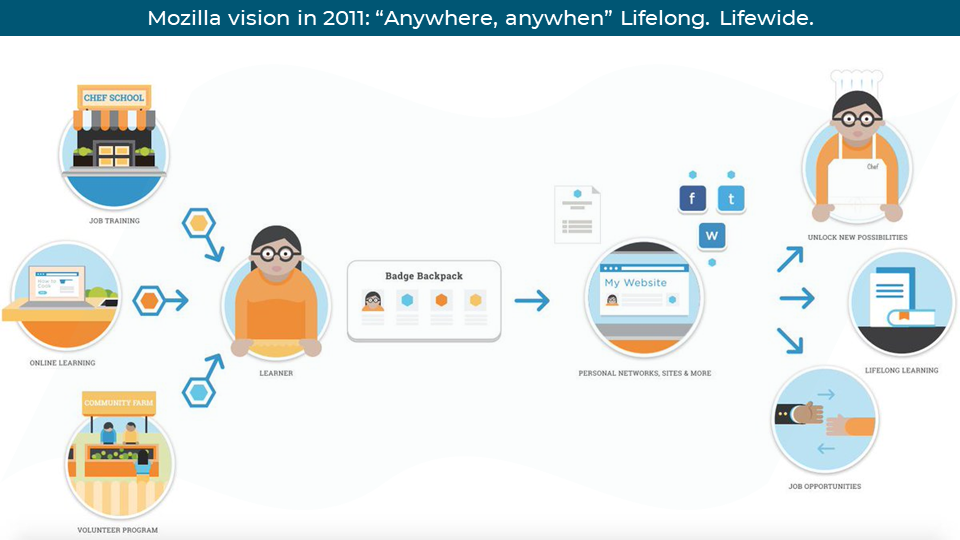
Open Badges are portable digital credentials that can be created and issued by a wide variety of organizations such as education and training institutions, professional associations, non-profits and private companies, for their students, members, staff, clients and partners.
The Open Badges technology standard is now stewarded by 1EdTech in the US, and is being adopted worldwide by a rapidly increasing number of organizations and learners.
Open Badges are becoming a standard “digital currency” for recognition of skills and lifelong learning.
Providing clarity with a transparent framework
Learning Agents, the company behind CanCred.ca, has developed a credentialing framework to inform the development of badges across a spectrum of formality. It’s based on professional consulting work for CanCred clients and other organisations beyond Canada, such as California State University, the Inter-American Development Bank and ITCILO.

New CanCred clients are supplied with badge templates with adaptable content that supports this framework.
Opening up recognition with Open Badges
Open Badges can be so much more than digital course certificates: they are flexible containers for inclusive, verifiable recognition. Thoughtful implementations of Open Badges unlock a world of recognition possibilities for lifelong learning, especially for informal or lifewide learning, gained through application and experience in the real world.
These principles are embedded in the 2016 Bologna Open Recognition Declaration (BORD), a global call for a universal open architecture for the recognition of lifelong and lifewide learning achievements, commonly expressed in Open Badges.
BORD continues to gather support worldwide. We encourage you to read it, and sign it if you support its principles (as we have), then to claim the BORD badge for yourself as a personalized example of open recognition.
Why CanCred?
CanCred Factory is a specialized platform for managing verifiable digital credentials based on the Open Badges standard, operating entirely in the Canadian cloud. CanCred Factory provides a centralized and simplified environment for issuing and maintaining high quality Open Badges. We provide the support your organization needs to successfully launch and manage a meaningful, consistent and sustainable credentialing system that will build your reputation over time.
Our technology is constantly improving to meet the evolving needs of the badge community and to maintain currency with the evolving Open Badges standard.
We also provide tools, content and guidance to help you build and support an inclusive spectrum of recognition, from formal micro-credentials on a blockchain to informal tokens of appreciation, respect and community connection — with full transparency to manage expectations of quality and “fitness for purpose”. For example, we provide templates for the badges in the Learning Agents Flexible Recognition Framework dislayed above on this page.
Key CanCred features
Video highlights - 2m30
Bilingual platform, multilingual badges, “Canada Aware”
As you would expect, CanCred is a bilingual platform for a bilingual country. CanCred also supports multilingual badges, not just global languages, but also Indigenous languages.
As Canadians, we also understand how Canada’s federal/provincial structure affects approaches to skills and training across the country.
Plus simple little things, like what NOC means!
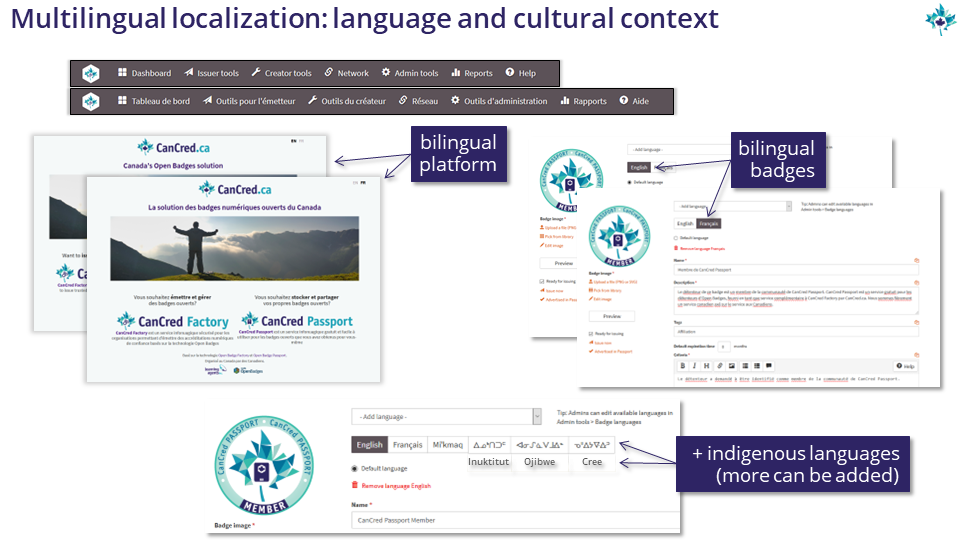
Simple badge pathways and stacking
CanCred provides simple ways to build pathway “steps” to Milestone badges, with “nesting” capability: Milestones can become steps to further Milestones. This simple system can support flexible branching and stacking of mandatory and elective learning options.
NB: CanCred Pro subscribers can also build learning pathway MiniMaps in optional community Spaces on CanCred Passport (see below)
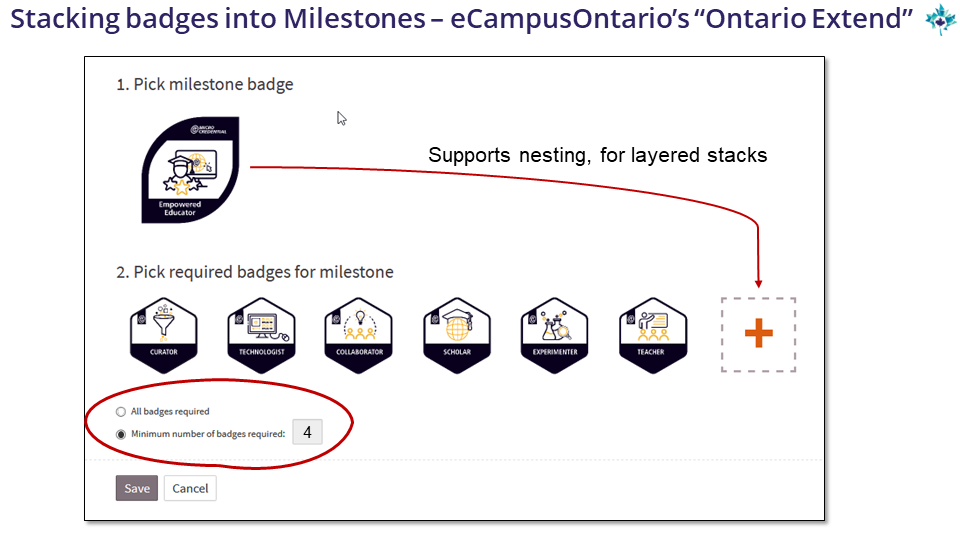
Badge Applications: “LMS Lite”
CanCred natively provides badge application submission forms – or what we like to call “LMS Lite”. There is no no “pre-registration barrier” to learner engagement — they don’t have to register in a learning platform before they engage with your learning: they can choose to be recognized at the end of a course, event, webinar or workshop, by telling you who they are and what they learned, answering your questions in a scaffolded form.
From your perspective, it’s a “smiley sheet on steroids”, an authentic report of your learning outcomes that can be analyzed for you and your funders. What’s more, their validated badge application can be linked as evidence in the badge you issue to them: authentic and personalized. This provides ongoing direct proof to others of what they learned from you, not to mention acting as a memory aid to your learners - particularly if you can include a link to the content or experience that they learned from! CanCred badges can be useful, lasting “capsules of learning”.
For maxiumum authenticity, badge applications are set by default for human assessment , enhanced by “human scaling” approaches, such as external reviewers, “correct answer” guides and multilevel reviewer panels, to distribute workloads and speed up assessment without sacrificing quality.
The system also supports self-assertions backed by evidence, which can be endorsed by others after the badge is issued, enabling your learners to develop their continuous learning skills, a key element of Adaptability, part of the Government of Canada’s lifelong Skills for Success model.
That’s why we say that badge applications are a key ingredient in CanCred’s secret sauce.
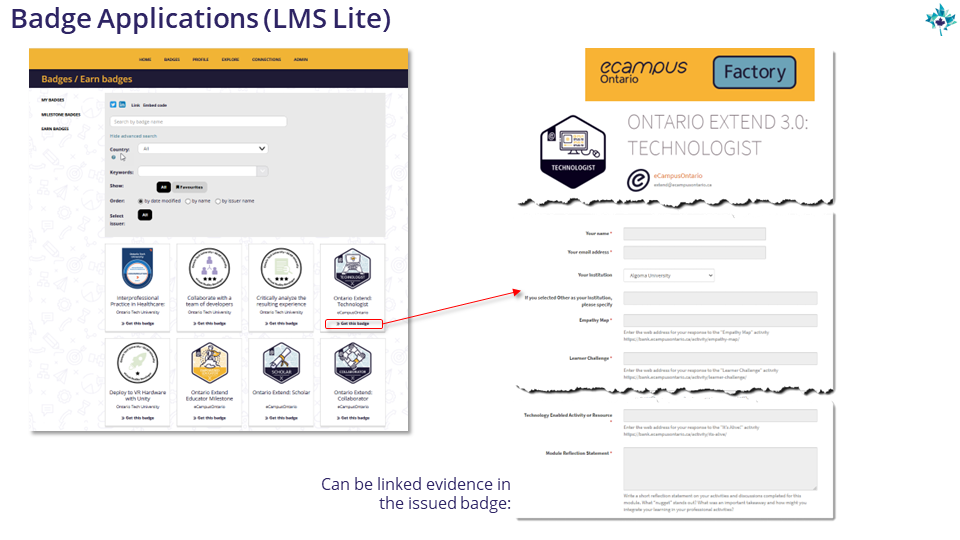
Branded Endorsement
Endorsements are descriptive recommendations by third party organizations that can significantly enhance the relevance and value of your badges. This can be formal accreditation by an authority or peer support from a partner. CanCred supports endorsement of issuing organizations AND endorsement of specific badges. More than visual branding on your badges or a simple “tick mark”, other organizations can describe in plain language why your badges are valuable to them.
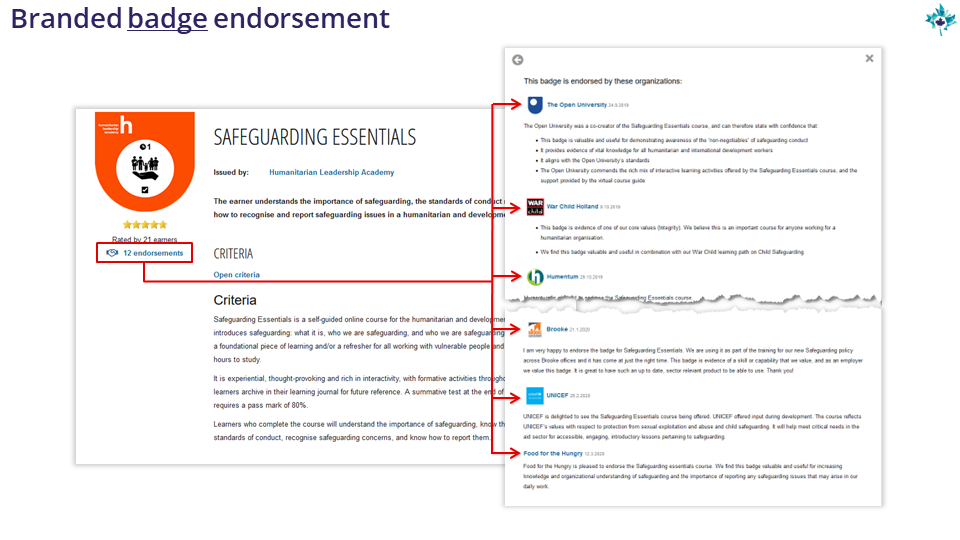
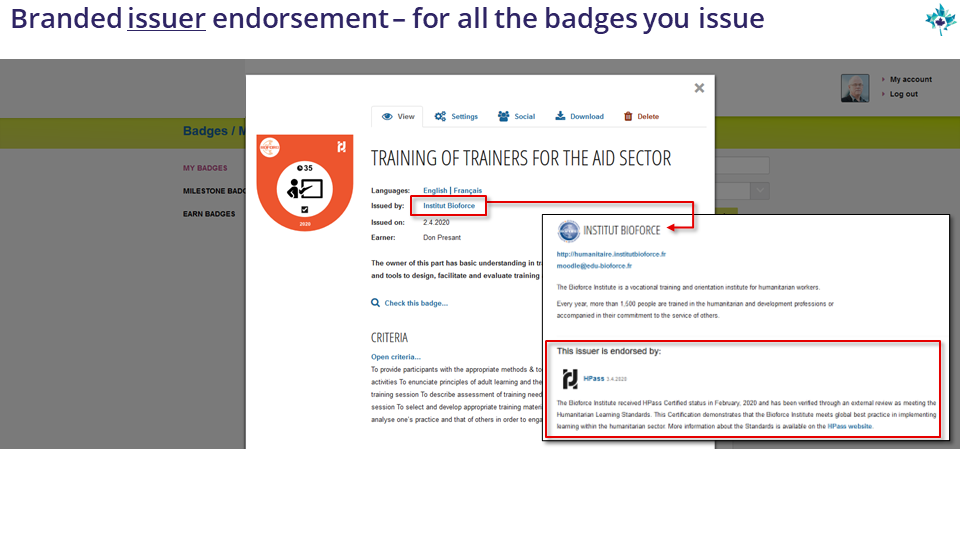
External Alignment
The Open Badges standard includes a feature called Alignment, where badge issuers can explicitly link their credential to an external reference to enhance the claim they are making in the badge. Alignment can be made to skills frameworks (Skills for Success or Advanced Manufacturing), but they can also map to other references, such as quality guidelines (eCampusOntario Principles and Framework) or social goals or resolutions (e.g. UN’s Sustainable Development Goals, or the UN Declaration on the Rights of Indigenous Peoples.) CanCred makes Alignment easier, by supporting not only manual Alignment, but also making it possible to navigate and pick from public frameworks such as Canada’s Skills for Success and the multilingual classification of European Skills, Competences, and Occupations (ESCO).
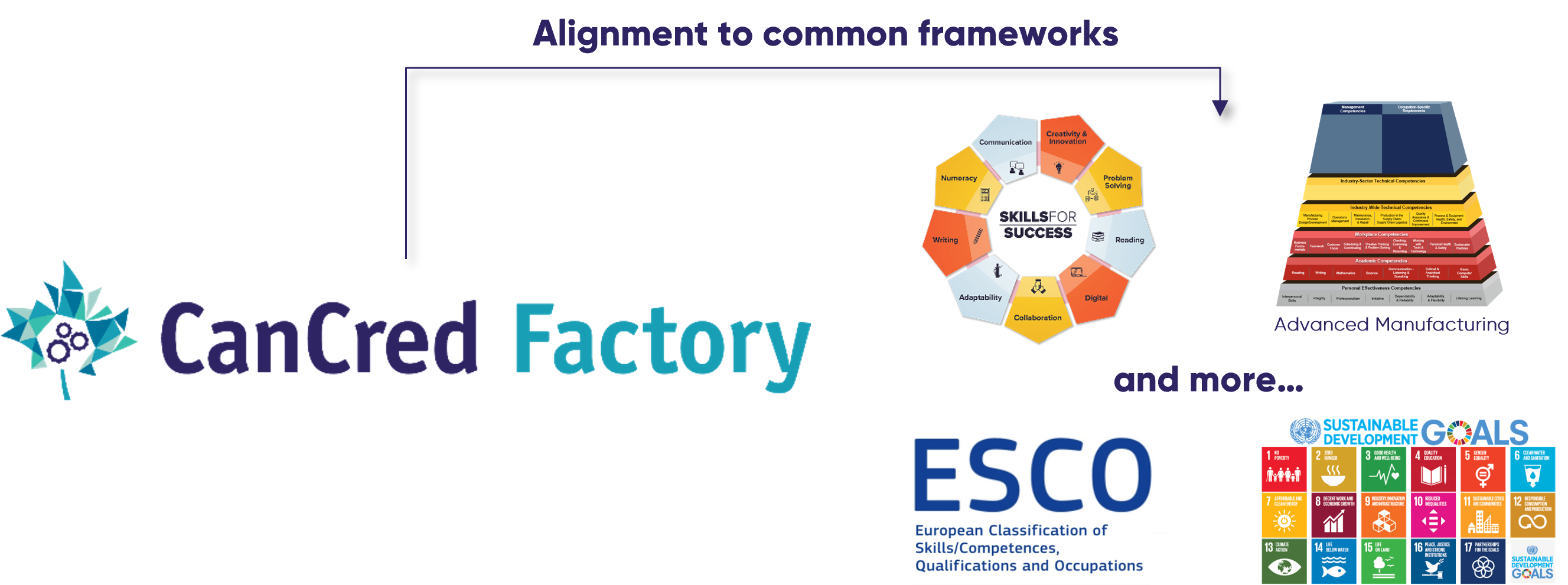
Customizable PDF badges
Open Badges are normally published as image files (e.g. PNGs) with embedded metadata, requiring a special Displayer platform like a Backpack or Passport to view the data that’s embedded inside the image.
But CanCred Pro subscribers can issue PDF badges that can be instantly read, downloaded, printed and emailed as attached evidence. Our PDF badges can also act like regular badges online – you can upload and share them from CanCred Passport. So it’s the best of both worlds. PDF badges have a default style and layout that you can customize for your purposes, such as creating impressive single-page certificates that can link to full display and verification online.
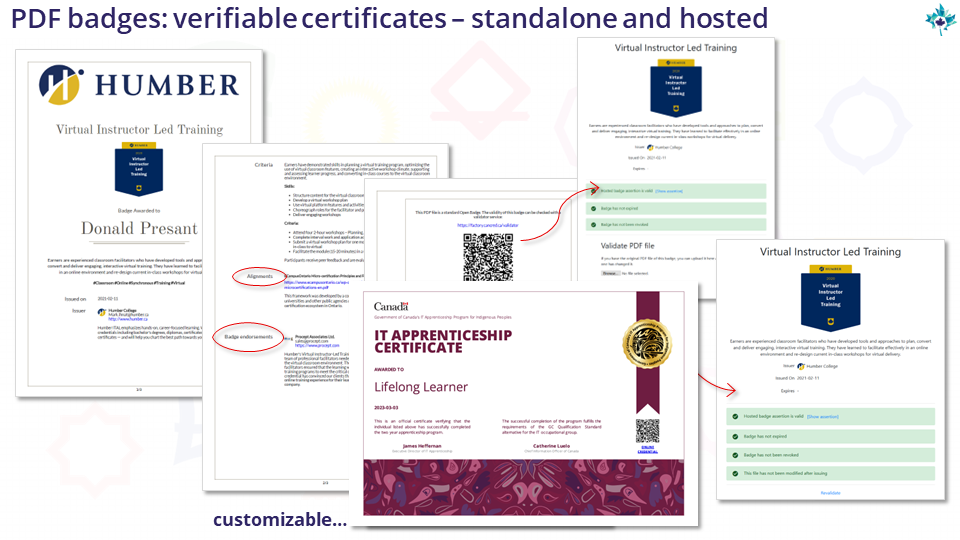
CanCred Passport: free badge portfolio
CanCred Passport is a free badge portfolio or wallet for your badge recipients. They can use their Passports to create skills portfolios that combine badges with other evidence to build career narratives that they can share as online “cover letters” or portfolios on their LinkedIn profiles.
By default, CanCred Passport is provided at no extra cost, but your organisation can optionally set up shop on Passport with community Spaces to engage with your learners further, instead of just sending them off to LinkedIn. Think of a Space as a branded “mini Passport” within CanCred Passport. You can use it as a socializing tool to connect earners with your organization through newsfeeds, badge and Profile follows, instant messaging, new badges to earn… even a version of OpenStreetMap, customized and filtered for your Space.
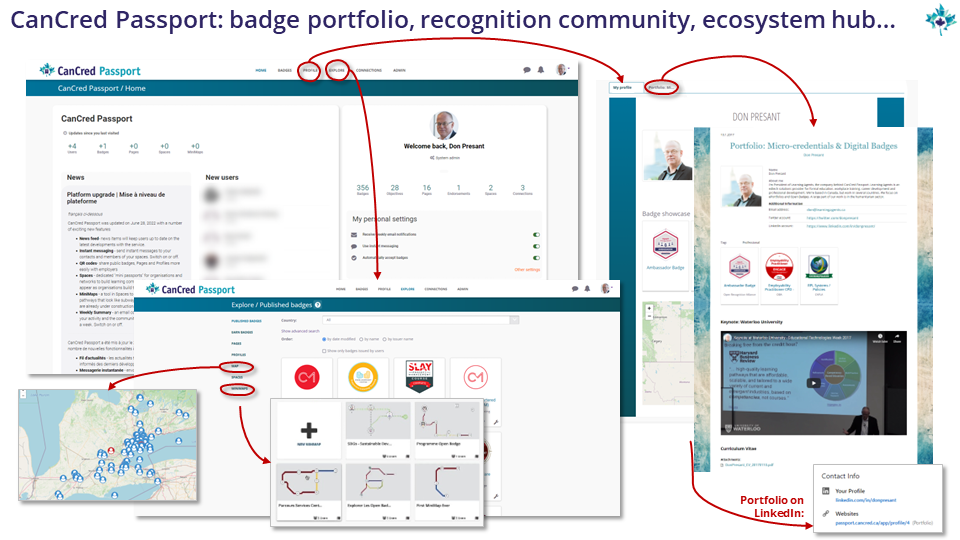
Onboarding services
CanCred is known for its responsive customer service. A great example of this is how we onboard new clients:
- 2 hours of configuration & customized platform training at the higher subscription levels (Premium and Pro), including:
- Account creation and configuration to recommended settings
- Light branding (using your website as a guide - editable!)
- Priming your badge library with generic templates matching our inclusive badge taxonomy
- Live walkthrough of the platform, customized to the needs of your team, which may include starting to create your first badge (Recorded via Zoom for future reference.)
- Followup email with links to relevant support materials, such as the Badge Image Design Guidelines and Badge Canvas
- Ongoing email support
- 2 further hours of live, hands-on ad hoc support at the highest subscription level (Pro)
For technical and consulting support needs that go beyond onboarding, CanCred also offers reasonably priced service bundles. Email us for details..
CanCred, sector by sector
Publicly funded education
Open Badges don’t compete with formal credentials awarded by colleges and universities - they can help bring them to life, providing a more complete and holistic picture of the learner.
As micro-credentials, well-composed badges can make well-structured courses and programs more visible, modular, and competency based.
As alternative credentials, digital badges can fill big gaps in recognition, such as for transferable employability skills like communication, teamwork and problem solving, usually developed by experiences outside the classroom.
Badges can also make specialty skills that have been embedded in longer programs more visible. And of course Continuing Education and Contract Training programs are a natural channel and a popular jumping off point for post-secondary institutions implementing micro-credentials.
Both kinds of credential improve a candidate’s chances in the job market by helping them highlight particular capabilities an employer may be seeking in authentic, verifiable ways that can include Work Integrated Learning.
Lots of learning that takes place outside the classroom and CanCred works with sub-organisations within larger instutitions to make that visible, including Student Services, Libraries and student associations to help make that learning visible.
Professional Development for educators has also been an early growth area for Open Badges, particularly in the areas of information literacy, ITC skills and digital pedagogy. “Badging the badgers”, or recognizing faculty professional development with badges can be a fundamental enabler for your broader badging initiatives as well as an innovative PD strategy. You can build a firm foundation by valuing the skills and achievements of your faculty and recognizing them with “résumé worthy” badges they can use to help further their own careers. They can then apply that new understanding to recognizing the skills and achievements of their students.
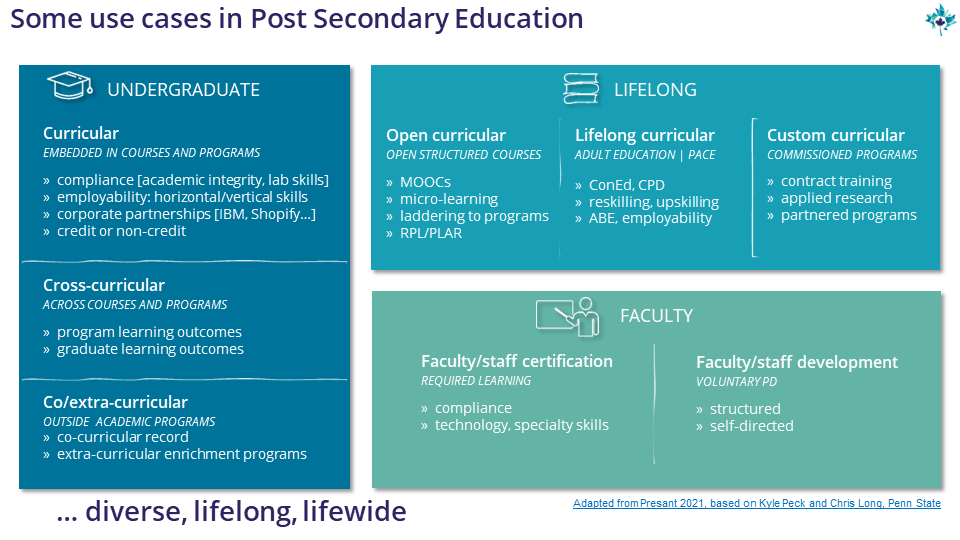
In the K12 sector, educators are using badges to recognize student achievement in experiential programs and Problem Based Learning. Our partner platform Open Badge Factory has enabled several succes stories in K12, ranging from Phenomenon Based Learning and a Teacher PD network in Finland to a nationwide implementation in Luxembourg.
Some recognition opportunities
Micro-credentials and more: modular programs, skills extracted from programs, graduate/program learning outcomes, co-curricular and extra-curricular learning, Work Integrated Learning, Continuing Education, contract training, staff and faculty PD.
See diagram above!
Some CanCred clients
eCampusOntario, Kwantlen Polytechnic University, University of Prince Edward Island, Seneca Polytechnic, Mohawk College, TMU Graduate Teaching Development Program, University of Alberta Students Union, Alberta School Boards Association
Private career colleges
Regulated career colleges across the country are also rapidly adopting micro-credentials in order to make their job-ready skills programs more visible, under the leadership of the National Association for Career Colleges.
Some recognition opportunities
Program credentials, Continuing Education micro-credentials, “job ready” certifications, faculty PD, employer training and recognition
Some CanCred clients
Medix College, Herzing University
Independent training organisations
Independent trainers fill an important role skills development across industry sectors nationwide, operating as small companies or even as one-person micro-enterprises, providing specialized training that meets specific customer needs.
CanCred makes it easy for these small, agile organisations to make the quality and value of their training more visible, offering affordable subscriptions and support to help them produce high quality badges.
Some recognition opportunities
Certificates and certifications for virtual or onsite training: B2C for individual registration, B2B for contract training.
Also: “Train the Trainer” certifications, franchised training accreditation
Some CanCred clients
Mariner, OneSmartWorld, Shift Facilitation
Professional associations and licencing bodies
Micro-credentials and other types of digital badges are a natural extension of the kind of professional education undertaken by professional associations and licencing bodies in health and other regulated sectors.
Beyond learning, Open Badges can also recognize members’ status, acquired professional knowledge and skills, thought leadership, achievement awards and service to the community. This helps associations recognize and acknowledge the knowledge and expertise of their members, increasing member retention and helping attract new members, especially younger members seeking to build their online digital profiles.
Finally, badges can help advance the community of practice that the association supports, including its knowledge base, effective practices and strategic goals. This makes the value of the work done by active practitioners work more visible to community members and the broader public, as members and supporters share badges.
According to the 2nd edition of The Business of Certification (Knapp and Knapp, 2017),
Microcredentials could play a valuable role in verifying the acquisition of knowledge and skills as they occur, as compared to certifications, which assess knowledge and skills possessed at a specific moment in a person’s career. Professionals are learning and developing both before and after their academic degrees and certifications . Often, they are learning incremnetally and outside of more formal learning contexts. Before microcredentials, no mechanism existed to recognize this gradual acquisition of knowledge and skills throughout the professional journey.
Some recognition opportunities
Professional Certification/Licencing, CE/CPD certificates, Educator accreditation, Membership, Awards, Events, Volunteer/community service and other “community of practice” forms of recognition.
Some CanCred clients
Canadian Association of Medical Radiation Technologists, Institute for Performance and Learning (formerly CSTD), Decorators & Designers Association of Canada, Hispanotech, Canadian Network of Asset Managers
Industry associations, sector bodies
Industry associations work hard to deliver value to their members and a lot of that value comes as lifelong learning opportunities, often packaged as courses and programs, but also less formally as industry conferences, workshops and webinars.
And work in this sector calls upon many skills that are acquired through unstructured informal learning and mentoring in the workplace. These skills aren’t normally recognized in formal credentialing systems. The less formal and more social learning opportunities can provide greater currency, relevance and value than structured courses, which need more time and resources to develop and maintain. All these lifewide learning activities can be captured and shared as they happen with agile badge systems.
Some recognition opportunities
Government funded certificate and certification programs for industry (e.g. leadership, DEI, change management, lean/6sigma), revenue-based learning programs, “train the trainer” programs for supervisors
Some CanCred clients
Excellence in Manufacturing Consortium, Cape Breton Island Tourism Training Network
Non-profits and charities
Mozilla invented Open Badges in 2011 with community non-profits and underserved audiences very much in mind, seeking to reduce barriers to qualification and employment for under-served groups such as in Adult Basic Education (ABE), services for youth Not in Employment Education or Training (NEET), Indigenous populations, people with disabilities, linguistic minorities, other historically and systematically excluded (HSE) communities and, of course, Canada’s growing population of international students and immigrants.
CanCred is proud to work with Canada’s non-profits and charities to empower these learners toward brighter futures, with appreciative, progressive learning approaches that use badges to activate and develop latent skills and interests.
Some recognition opportunities
Essential skills, Skills for Success, “Employment Ready” training program certifications, practitioner professional development, Corproate Social Recognition and sponsor recognition
Some CanCred clients
North Forge, Toronto Centre of Learning & Development, 10Carden
Employers and workplaces
Open Badges offer the same possibilities for workplace and work-related learning as for educational institutions and associations. Internal trainers make their courses and their resulting skills more visible, mapped to workforce objectives. Both employers and employees benefit from the badges that are earned.
Working with badges, employers can assess the benefits of training, assemble teams for projects and manage rising talent by analyzing badge reports against skills goals for individual employees and departments. Employees can use badges to demonstrate their skills and knowledge when applying for jobs or career advancement. Fixed-term badges with expiry dates can certify time-sensitive competencies in areas such as technology, health, and workplace safety - badge expiry can be the signal for a training refresher.
Innovative companies are also starting to use micro-credentials and other badges to meet broader recognition needs in External Enterprise Learning (“Value Chain Learning”), such as for supplier, partner and customer development.

Some recognition opportunities
In-house training certificates and certifications, coaching and mentoring, self-directed learning and career pathing, learning and emplyment records, awards and recognition
Some CanCred clients
Canada School for Public Service, Treasury Board of Canada Secretariat, Oak Valley Health
Frequently Asked Questions
What are Open Badges?
Open Badges is the technical term for a global standard for smart digital credentials that can travel with the people who earn them. Open Badges contain structured information, or metadata, that is standardized for easier sharing and can be evaluated and verified via embedded links. This leads to trusted recognition for learners and makes their credentials more portable and meaningful.
Badge earners can collect multiple badges from many different issuers across different learning contexts in their lives to tell a more complete story of their skills, achievements and interests. They can share their badges on social media such as LinkedIn or manage them in skills portfolios in order to achieve their career and lifelong learning goals.
The Open Badges standard was created by Mozilla Foundation in 2011 to refocus on the needs of all learners, and to better recognize lifelong and lifewide learning. The standard has since been adopted by educators and trainers, and by all kinds of organizations and companies around the world.
In January 2017, IMS Global Learning Consortium (now 1EdTech) took over stewardship of the Open Badges technology standard from Mozilla. The standard continues to evolve to meet the needs of learners and those who recognize them.
Learn more at openbadges.org
What is CanCred Factory?
CanCred Factory is a leading platform for issuing Open Badges in Canada. Technically, it is identical to Open Badge Factory, its European counterpart, with the same comprehensive set of tools for creating, issuing and managing Open Badges and the same respect for privacy. But CanCred Factory is a distinctly Canadian service, hosted on servers in Canada and focused on the needs of Canadian badge issuers and learners.
CanCred Factory is owned and managed by Learning Agents, an award-winning Canadian educational technology company.
Are CanCred Factory digital badges Open Badges?
Of course! The badges created and issued by CanCred Factory are fully compliant with the Open Badges specification, originally developed by Mozilla Foundation and now managed by 1EdTech.
The technology behind CanCred Factory in Canada is identical to Open Badge Factory with the same set of tools for creating, issuing and managing Open Badges. Open Badge Factory is certified Open Badges by 1EdTech.
Why not badge with my LMS?
Issuing badges with the built-in capability of a Learning Management System (LMS) such as Moodle or Brightspace can be easy to start, but hard to control.
Here are some of the issues that can come up:
-
“Wild West” badging - ad hoc badge creation by educators at the course level can lead to a fragmented non-strategy at your organization or institution. Are your badges just for course gamification, or do you want them to have recognition value? You need a central control hub like CanCred and system-wide set of tools and procedues to manage your badge strategy.
-
“Badge rot” - course level badges can be deleted or corrupted as courses are edited over time or if you migrate from your current platform. CanCred Factory badges are securely stored on an external cloud platform. When you issue a badge using a CanCred Factory LMS plugin, your badges will be safely stored and centrally managed in CanCred Factory. They’ll remain functional and valid even if your organization decides to replace your current learning platform with a new one.
-
“Swiss army knife syndrome” - would you use the scissors tool on a Swiss army knife or a real pair of scissors to cut a piece of paper? The badging module in your LMS is just one of many tools its developers have to maintain on their ever more complex platforms. This means less focus, fewer features, a limited road map, and a constant struggle to maintain compliance with the evolving Open Badges standard. It’s difficult to be all things to all people!
-
“Badging inside the box” - the typical learning platform or LMS has little support for issuing badges outside of its confines. Using CanCred Factory, you can badge within courses or on the job, online or in real life, in formal or informal situations, by using adaptable tools such as claim codes, badge application forms and linkages to specialized assessment platforms.
You can issue CanCred badges from inside your LMS with a plugin. Having a specialized, centrally managed platform like CanCred Factory that independent of your LMS means you’re not limited to your choice of LMS. You can badge your learners wherever they learn, and manage your badges in one place. This avoids fragmentation of your badge strategy, ensuring a long life for your badges and maximizes recognition opportunities for your learners.
What platforms work with CanCred?
Plugins, also known as client applications, have been developed for Moodle, Totara LMS, WordPress, Priima, ItsLearning, Canvas LMS and D2L Brightspace. More plugins are being added. These plugins make it possible to issue badges based on course completions inside the LMS but to manage them centrally in CanCred Factory.
We have also developed a proxy server as a value added service option, to accelerate platform integration.
Plugins and other ways to integrate to CanCred can be found on our Integrations page of the Open Badge Factory website.
Can we develop plugins for our own systems?
Yes! We encourage this. We provide a documented Open RESTful API that developers can use to create their own plugins.
CanCred Factory also supports Learning Tools Interoperability (LTI) services at the Pro level.
Learn more on our Integrations page. If you don’t have your own developers, email us to explore how we can help!
What does it cost to use CanCred Factory?
You can try CanCred Factory free for 60 days at the (top) Pro level.
After 60 days, we offer 4 service levels: Free, Basic, Premium and Pro.
At the Free level you can access CanCred Factory’s basic features, but your library of issuable badges is limited to two badges. This service level is convenient for developers who want to test their plugins or for organizations that only need to issue one or two badges.
See a Pricing summary on our Home Page or check out our Detailed Feature Comparison.
Can we move from one level to another?
Yes! You can easily move up and down service levels. Email us for details.
What does Verified by CanCred Factory mean?

The stamp above will be displayed with your badges if we can verify that at least the admin user of your account belongs to your organisation. Becoming a verified issuer is only possible at the Premium and Pro subsciption levels.
How do I get started with CanCred Factory?
Email us for a platform tour and an exploration of your subscription options, which include a comprehensive onboarding service at Premium and Pro levels.
If you want to explore the platform by yourself first, Register for a 60 day free trial of CanCred Factory at the (top) Pro level.
As the trial period draws to a close, you’ll have the option to purchase a paid subscription at the Pro, Premium or Basic level. If you choose none of these, your account will lapse to the Free level, with a maximum of 2 badges in your catalogue and other limitations, but you can continue issuing those two badges.
Any badges you issue during the free trial or after will be hosted and verifiable indefinitely - we have no reason to delete them (guaranteed for at least 2 years). You do also have the option of deleting your free trial account entirely.
How do I get started with badges and micro-credentials?
We recommend an “agile” approach to developing your badging initiative:
Think big, start small!
Give yourself a chance to explore and learn from experience and to think beyond your initial assumptions about credentials…
Explore the technology
Do some hands-on exploration in “sandbox mode” in CanCred to build a basic understanding and generate ideas. Issue test badges to yourself and others, go through the process of accepting and sharing them, to provide a learner perspective. We like to say “issue early, issue often”.
Check out the short video tutorials on our Help page to learn the basic functions and just explore the platform.
Reflect and reach out
After some hands-on experience, have a think and discuss with others what you’re hoping to accomplish with Open Badges and who your audiences are. It’s not just about who’s earning the badges. Who will be viewing and evaluating them, and why? Are they employers seeking or developing staff? Associations recognizing professional development? Educational institutions recognizing learning?
Hold an event like a town hall in your community, bringing different sectors together to brainstorm local needs.
Use our free Badge Design Canvas worksheet as a useful tool to help focus your thinking.
Co-design, co-create and co-pilot
Work with local partners, such as business and industry associations and community non-profits to co-design and co-develop solutions. Start small, with “low-hanging fruit”: a low-risk low-stakes opportunity, such as active event participation, volunteer service recognition, or another area where there’s an unmet need for recognition. Try a Minimum Viable Product (MVP) badge to test your assumptions, and see how it’s received.
Use the Learning Agents Flexible Recognition Framework to guide your thinking about what to recognize and how:

Communicate and market!
Set up a dedicated page on your website, explaining about badges and what you’re doing with them. Disseminate guides and materials for learners and employers explaining how to use badges. Use authentic testimonials to support your message. Use video and social media to amplify your message.
Analyze, pivot, improve, repeat, grow
Learn from your first MVP badges and progressively build out your badge systems, expanding into new areas over time.
Build partnerships to expand your recognition footprint
Build the power of your badges by reaching out to other stakeholders in your various networks. Explore partnership opportunities for mutual recognition, endorsement and shared alignment to common frameworks for skills, qualification levels and standards.
Get started with these tools!
Download these planning tools to support your design process:
- Badge Design Canvas - our adaptation and extension of a longtime useful brainstorming tool in the Open Badges community as a Powerpoint workbook. Use this tool to plan your overall credentialing system and sketch in badge content. It includes a Taxonomy that you can adapt for your context. This can be used solo, or as a group collaboration tool. Licenced Creative Commons with Attribution (CC BY).
- Badge Creation Worksheet - use this Word tool to develop detailed metadata for your badges and micro-credentials. This tool leverages to Taxonomy above to provide content prompts for different kinds of badges and micro-credentials. Licenced Creative Commons with Attribution (CC BY).
- Open Badges Visual Design Guidelines - use these guidelines to create well-designed badge images that support the meaning of your credentials.
- Details and Branding - this handy little tool will help you create a well-configured organizational branding presence on CanCred.

